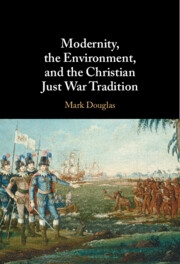Book contents
- Modernity, the Environment, and the Christian Just War Tradition
- Modernity, the Environment, and the Christian Just War Tradition
- Copyright page
- Contents
- Acknowledgments
- Introduction: Troubling a Tradition
- 1 Engaging the Other
- 2 Understanding the Self
- 3 Shaping the State
- 4 State Time/Secular Time
- 5 Christian Just War Thinking and Modernity
- 6 Historical Roots and Roads Not Taken
- 7 Renarrating the Christian Just War Tradition
- Afterword
- Select Bibliography
- Index
4 - State Time/Secular Time
The US Constitution as a Christian Just War Document
Published online by Cambridge University Press: 05 May 2022
- Modernity, the Environment, and the Christian Just War Tradition
- Modernity, the Environment, and the Christian Just War Tradition
- Copyright page
- Contents
- Acknowledgments
- Introduction: Troubling a Tradition
- 1 Engaging the Other
- 2 Understanding the Self
- 3 Shaping the State
- 4 State Time/Secular Time
- 5 Christian Just War Thinking and Modernity
- 6 Historical Roots and Roads Not Taken
- 7 Renarrating the Christian Just War Tradition
- Afterword
- Select Bibliography
- Index
Summary
That the Constitution of the United States of America might be thought of as a Christian document is even stranger than thinking of it as a just war document. Using – if also criticizing – the work of German political theorist Carl Schmitt, this chapter argues for a distinct kind of political theology understood in terms of time and that, in this regard, the Constitution reveals a kind of temporal posture that might best be understood, at least broadly, as “Christian.” The distinct way that the Constitution imagines time and how to stand in it (a posture in time) aligns best with the vision of time offered by Protestants – and particularly those in the Reformed tradition – at the time of the document’s writing. The way the United States and other constitutions imagine time continues to shape jurisprudence and societies. Troublingly, this temporal posture manifests in three problems that make the likelihood and shape of climate-shaped violence especially acute: using temporal deferral as a delaying maneuver, confusing optimism with hope, and fetishizing a particular modern expression of freedom.
Keywords
- Type
- Chapter
- Information
- Modernity, the Environment, and the Christian Just War Tradition , pp. 174 - 222Publisher: Cambridge University PressPrint publication year: 2022

